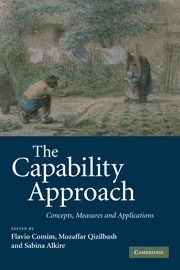Book contents
- Frontmatter
- Contents
- List of figures
- List of tables
- List of contributors
- List of acronyms
- Acknowledgements
- Introduction
- 1 Using the capability approach: prospective and evaluative analyses
- PART I Concepts
- PART II Measures
- 7 Do concepts matter? An empirical investigation of the differences between a capability and a monetary assessment of poverty
- 8 Social exclusion in the EU: a capability-based approach
- 9 Complexity and vagueness in the capability approach: strengths or weaknesses?
- 10 Operationalising Sen's capability approach: the influence of the selected technique
- 11 Operationalizing capabilities in a segmented society: the role of institutions
- PART III Applications
- Index
- References
7 - Do concepts matter? An empirical investigation of the differences between a capability and a monetary assessment of poverty
Published online by Cambridge University Press: 22 September 2009
- Frontmatter
- Contents
- List of figures
- List of tables
- List of contributors
- List of acronyms
- Acknowledgements
- Introduction
- 1 Using the capability approach: prospective and evaluative analyses
- PART I Concepts
- PART II Measures
- 7 Do concepts matter? An empirical investigation of the differences between a capability and a monetary assessment of poverty
- 8 Social exclusion in the EU: a capability-based approach
- 9 Complexity and vagueness in the capability approach: strengths or weaknesses?
- 10 Operationalising Sen's capability approach: the influence of the selected technique
- 11 Operationalizing capabilities in a segmented society: the role of institutions
- PART III Applications
- Index
- References
Summary
This chapter aims to evaluate the empirical consequences of the theoretical debate on the nature of poverty, focusing in particular on the differences between Sen's capability approach and the mainstream monetary approach. Such an analysis provides a constructive link between theoretical debates and the practice of poverty assessments. In fact, if at the empirical level the association between alternative indicators of deprivations is so strong that different approaches appear as approximately equivalent, the policy relevance of the theoretical debates on the concepts of poverty is greatly diminished. We will explore whether this is really the case with reference to Peru. Beginning with a brief review of Sen's capability approach and its critique of standard monetary-based assessments of poverty, a framework for comparing capability-based and consumption-based approaches is suggested. Our results are then presented, aiming at identifying the relationship between monetary resources and individual achievements by testing for the significance and size of the ‘parametric variations’ at the core of Sen's argument against identifying poverty with monetary indicators. The findings are, however, also helpful to think of policy priorities in a capability perspective as opposed to a monetary one, as well as for identifying issues on which more work is needed in order to enhance the ability of the capability approach to inform policies.
Introduction
Poverty as a category is hard to define.
Information
- Type
- Chapter
- Information
- The Capability ApproachConcepts, Measures and Applications, pp. 203 - 241Publisher: Cambridge University PressPrint publication year: 2008
References
Accessibility standard: Unknown
Why this information is here
This section outlines the accessibility features of this content - including support for screen readers, full keyboard navigation and high-contrast display options. This may not be relevant for you.Accessibility Information
- 15
- Cited by
